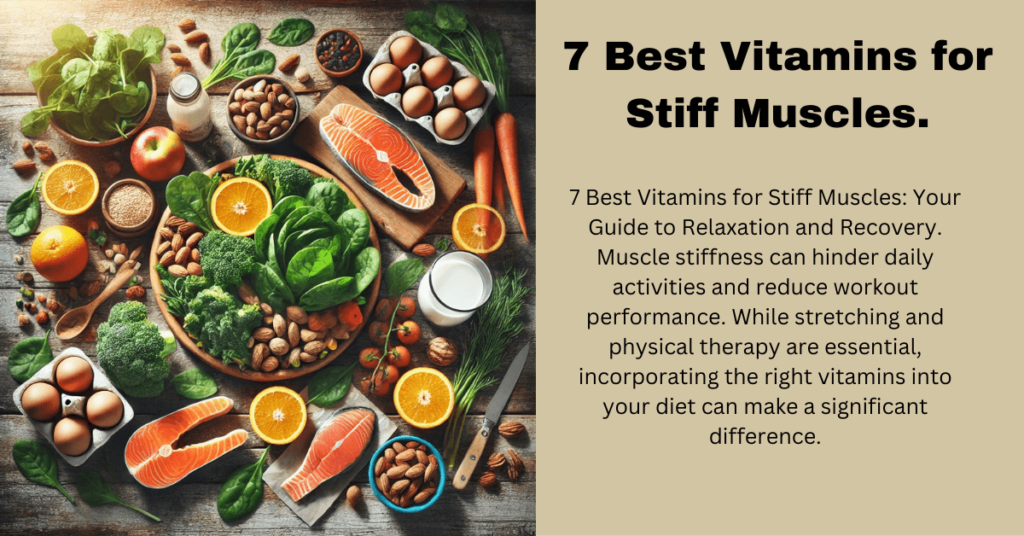7 Best Vitamins for Stiff Muscles: Your Guide to Relaxation and Recovery. Muscle stiffness can hinder daily activities and reduce workout performance. While stretching and physical therapy are essential, incorporating the right vitamins into your diet can make a significant difference. In this article, we explore the 7 best vitamins for stiff muscles, how they work, and where you can find them.

1. Vitamin D: The Key to Muscle Flexibility
Vitamin D is often called the “sunshine vitamin” because it’s produced in your body through sunlight exposure. It plays a critical role in calcium absorption and muscle function, helping alleviate stiffness and promoting flexibility.
Benefits of Vitamin D for Stiff Muscles
- Reduces muscle stiffness caused by vitamin D deficiency.
- Enhances muscle contraction and relaxation.
- Supports overall bone and muscle health.
Sources of Vitamin D:
- Sunlight (15-20 minutes daily).
- Fatty fish like salmon and tuna.
- Fortified foods such as milk, cereals, and orange juice.
- Supplements, if recommended by a healthcare provider.
2. Vitamin E: Protecting Muscles from Oxidative Stress
Vitamin E is a powerful antioxidant that helps neutralize free radicals, reducing inflammation and oxidative stress in muscle tissues. This can significantly ease stiffness and promote recovery.
Benefits of Vitamin E for Stiff Muscles
- Protects muscles from damage caused by free radicals.
- Reduces inflammation that leads to stiffness.
- Improves blood circulation, aiding muscle relaxation.
Sources of Vitamin E:
- Nuts and seeds (almonds, sunflower seeds).
- Vegetable oils (sunflower, safflower).
- Spinach, broccoli, and avocados.
3. Vitamin C: Boosting Collagen and Recovery
Vitamin C is essential for collagen production, a protein that maintains healthy connective tissues and muscles. Its antioxidant properties also aid in reducing inflammation that contributes to stiffness.
Benefits of Vitamin C for Stiff Muscles
- Promotes collagen synthesis for improved muscle elasticity.
- Reduces oxidative stress and inflammation.
- Speeds up recovery from muscle stiffness and soreness.
Sources of Vitamin C:
- Citrus fruits like oranges, lemons, and grapefruits.
- Strawberries, bell peppers, and kiwi.
- Tomatoes, spinach, and Brussels sprouts.
4. Vitamin B Complex: Energizing and Relaxing Muscles
The B vitamins, especially B6, B12, and folic acid, play a crucial role in muscle function and energy production. These vitamins help reduce stiffness by improving blood flow and nerve function.
Benefits of Vitamin B Complex for Stiff Muscles
- Enhances energy levels, reducing fatigue-related stiffness.
- Supports nerve health for proper muscle contraction.
- Promotes muscle repair and recovery.
Sources of Vitamin B Complex:
- Whole grains and fortified cereals.
- Lean meats, poultry, and fish.
- Eggs, dairy products, and leafy greens.
- Supplements, if needed.
5. Magnesium: The Muscle Relaxation Mineral
While not a vitamin, magnesium is a vital nutrient for muscle relaxation and stiffness reduction. It works closely with vitamins to regulate muscle contraction and ease cramps.
Benefits of Magnesium for Stiff Muscles
- Relieves muscle cramps and spasms.
- Promotes relaxation by regulating calcium and potassium levels.
- Supports overall muscle and nerve function.
Sources of Magnesium:
- Nuts and seeds (pumpkin seeds, almonds).
- Leafy greens like spinach and kale.
- Whole grains and legumes.
- Dark chocolate.
6. Vitamin K: Strengthening Muscle and Bone Connection
Vitamin K is essential for maintaining strong bones and proper muscle function. It works synergistically with vitamin D to ensure calcium is directed to bones and muscles, reducing stiffness.
Benefits of Vitamin K for Stiff Muscles
- Improves muscle strength and elasticity.
- Reduces stiffness by enhancing calcium utilization.
- Supports overall skeletal muscle health.
Sources of Vitamin K:
- Leafy greens (kale, spinach, broccoli).
- Fermented foods like natto.
- Dairy products and eggs.
7. Vitamin A: Reducing Inflammation for Muscle Relief
Vitamin A is crucial for reducing inflammation, a common cause of muscle stiffness. It also supports tissue repair, ensuring muscles recover quickly from stress or strain.
Benefits of Vitamin A for Stiff Muscles
- Lowers inflammation in muscle tissues.
- Enhances muscle recovery and repair.
- Supports the production of new muscle cells.
Sources of Vitamin A:
- Orange and yellow vegetables (carrots, sweet potatoes, pumpkin).
- Leafy greens like kale and spinach.
- Liver, fish oils, and fortified dairy products.
How to Incorporate These Vitamins for Maximum Benefit
Including these 7 best vitamins for stiff muscles in your diet can provide long-term relief and support. Here are some tips:
Balanced Diet:
Ensure each meal contains a variety of nutrient-dense foods to cover your vitamin needs. Include fresh fruits, vegetables, lean proteins, and whole grains.
Supplements:
If you struggle to meet your vitamin requirements through food alone, consider supplements. Consult a healthcare provider to determine the right dosage for your needs.
Stay Hydrated:
Proper hydration aids in nutrient absorption and muscle relaxation. Drink plenty of water throughout the day.
Timing Matters:
Take vitamins like vitamin D and magnesium at specific times of the day for better absorption and effectiveness.
Conclusion
Dealing with stiff muscles doesn’t have to be a constant struggle. By including these 7 best vitamins for stiff muscles in your diet, you can improve muscle flexibility, reduce inflammation, and enhance recovery. Combine proper nutrition with regular exercise, hydration, and rest to achieve optimal muscle health. Start incorporating these vitamins into your routine today and experience the difference they make.

